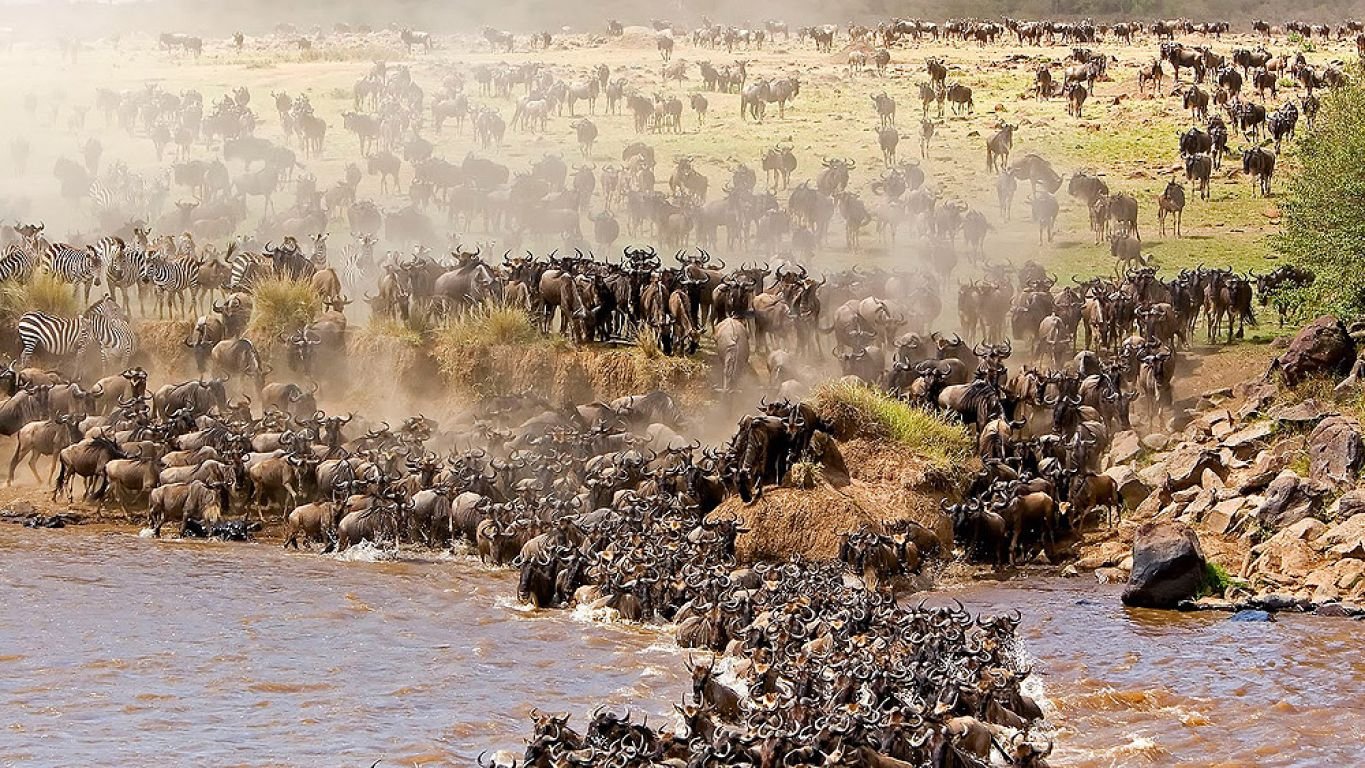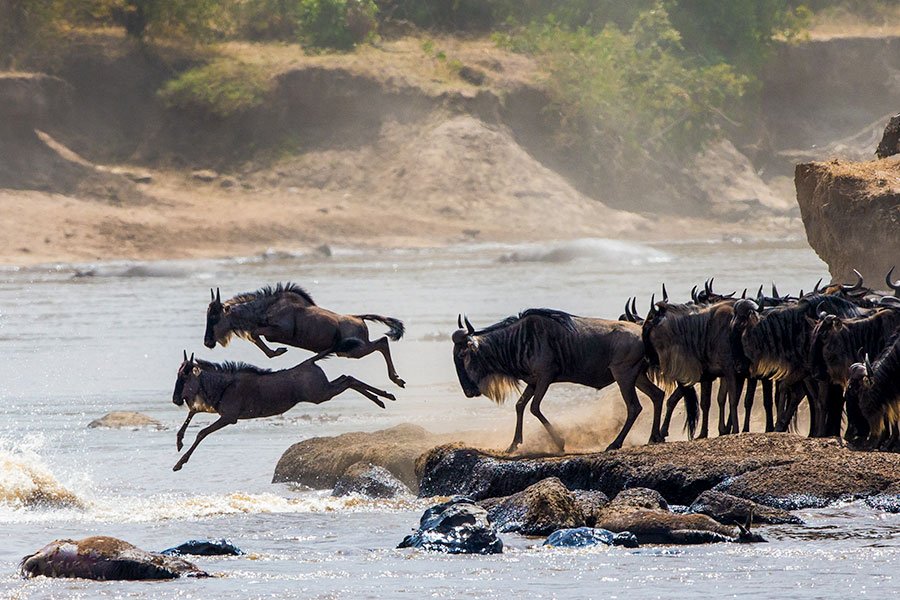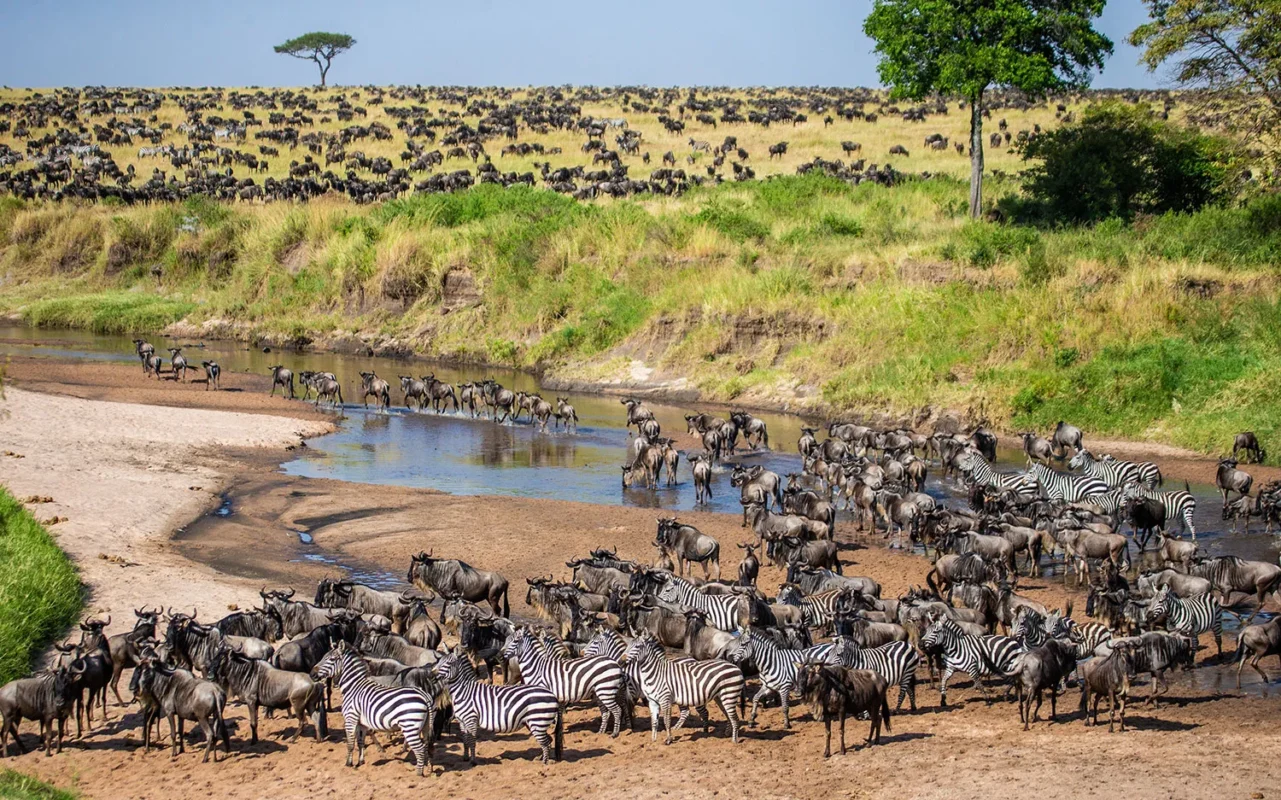The Great Migration is one of the most spectacular natural phenomena on Earth, captivating wildlife enthusiasts, photographers, and adventurers alike. It is a dramatic journey that unfolds across the vast The Great Migration is one of Earth’s most spectacular natural events. Every year, millions of wildebeest, zebras, and gazelles embark on an epic journey across East Africa. This incredible migration takes place primarily in the Serengeti National Park in Tanzania and the Maasai Mara National Reserve in Kenya. It’s a thrilling and challenging adventure for these animals, filled with drama and danger. In this article, we’ll explore the Great Migration, its ecological importance, and how you can experience it with Providence Safari.

What is the Great Migration?
The Migration Cycle
The Great Migration is a yearly event involving over 1.5 million wildebeest, 200,000 zebras, and thousands of gazelles. Driven by the search for fresh grass and water, these animals follow a predictable path. Here’s a breakdown of their journey:
- Calving Season (January – March): The migration starts in the southern Serengeti, where more than 500,000 calves are born. This time is critical as the young animals are vulnerable to predators. The Serengeti’s rich grasslands provide the necessary nourishment for their survival.
- The Move North (April – June): As the grass in the south dwindles, the herds move northward to the central Serengeti. This migration involves large groups traveling together, guided by experienced leaders.
- Crossing the Grumeti River (June – July): One of the most dramatic moments is crossing the Grumeti River. The herds face danger from crocodiles waiting in the water. This crossing is both thrilling and perilous.
- The Maasai Mara (July – October): By July, the herds reach Kenya’s Maasai Mara. Here, they find lush grasslands but also face increased predator activity. This is a crucial time for the animals as they graze and prepare for their return journey.
- Return to the Serengeti (October – December): As the rains end, the herds begin their journey back south to the Serengeti. This return journey involves navigating less dangerous terrain and eventually returning to the calving grounds.
The Role of Predators
The Great Migration is not just about the herbivores. Predators such as lions, cheetahs, and hyenas also play a key role. When the herds arrive in the Maasai Mara, predators take advantage of the abundance of prey. This predator-prey relationship helps maintain the balance in the ecosystem.
Why the Great Migration Matters
The Great Migration is essential for the health of East Africa’s ecosystems. Here’s how:
- Maintaining Grassland Health: The animals’ grazing prevents overgrowth of grasses and promotes new growth. This keeps the ecosystem balanced and supports a variety of plant and animal life.
- Nutrient Cycling: The migration cycle helps recycle nutrients through the ecosystem. Animal droppings fertilize the soil, which benefits plant growth.
- Creating Habitats: The movement of the herds creates diverse habitats that support various species. This dynamic environment fosters rich biodiversity.
- Water Distribution: The migration spreads out the use of water resources, preventing overuse of any one area. This ensures sustainable water use.
Experience the Great Migration with Providence Safari
At Providence Safari, we offer unforgettable experiences to witness the Great Migration. Here’s how you can make the most of this spectacular event:
Safari Packages
We offer a variety of safari packages to fit different interests and budgets. Choose from:
- Luxury Lodges: Stay in high-end lodges with stunning views of the migration. Enjoy comfort and style while being close to the action.
- Mobile Tented Camps: Experience the migration up close with our mobile tented camps. These camps move with the herds, offering a unique and immersive experience.
- Private Safaris: Opt for a private safari for a personalized experience. Enjoy exclusive access to guides and vehicles tailored to your preferences.
Expert Guides
Our guides are experts in the Great Migration and East African wildlife. They provide insightful commentary and ensure you get the best possible experience. Their knowledge enhances your understanding of the migration and the animals.
Responsible Tourism
We are committed to responsible tourism at Providence Safari. We focus on sustainable practices to minimize our environmental impact and support local communities. Our goal is to preserve East Africa’s natural beauty while offering you an amazing experience.
Photography and Viewing
The Great Migration offers excellent opportunities for wildlife photography. Our safaris are designed to maximize your viewing and photography chances, with well-positioned vehicles and expert guidance.
Preparing for Your Safari
To ensure a great safari experience, here are some tips:
- Packing Essentials: Bring lightweight, breathable clothing for varying temperatures. Don’t forget sunscreen, a wide-brimmed hat, and binoculars.
- Health and Safety: Make sure you have necessary vaccinations and malaria prophylaxis. Travel insurance is also recommended.
- Camera Gear: For photography enthusiasts, bring a good camera with a zoom lens. Pack extra memory cards and batteries.
- Cultural Sensitivity: Respect local customs and traditions. Engage with local communities in a respectful manner.
Conclusion
The Great Migration is a breathtaking showcase of nature’s power and beauty. Witnessing this incredible journey is an experience like no other, connecting you with the rhythms of the natural world. At Providence Safari, we are dedicated to providing an unforgettable adventure, allowing you to experience one of nature’s greatest spectacles.
Whether you’re a seasoned safari-goer or a first-time visitor, the Great Migration has something for everyone. Book your adventure with Providence Safari and prepare to be amazed by this extraordinary journey of life and survival.
For more information on our safari packages and to book your experience, visit Providence Safari today..


